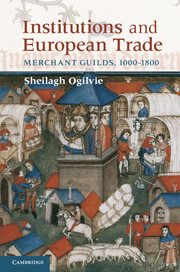Book contents
- Frontmatter
- Contents
- Acknowledgements
- 1 Merchant guilds, efficiency and social capital
- 2 What was a merchant guild?
- 3 Local merchant guilds
- 4 Alien merchant guilds and companies
- 5 Merchant guilds and rulers
- 6 Commercial security
- 7 Contract enforcement
- 8 Principal-agent problems
- 9 Information
- 10 Price volatility
- 11 Institutions, social capital and economic development
- Bibliography
- Index
5 - Merchant guilds and rulers
Published online by Cambridge University Press: 05 June 2012
- Frontmatter
- Contents
- Acknowledgements
- 1 Merchant guilds, efficiency and social capital
- 2 What was a merchant guild?
- 3 Local merchant guilds
- 4 Alien merchant guilds and companies
- 5 Merchant guilds and rulers
- 6 Commercial security
- 7 Contract enforcement
- 8 Principal-agent problems
- 9 Information
- 10 Price volatility
- 11 Institutions, social capital and economic development
- Bibliography
- Index
Summary
If you come to a place where the king or some other chief who is in authority has his officials, seek to win their friendship; and if they demand any necessary fees on the ruler's behalf, be prompt to render all such payments, lest by holding too tightly to little things you lose the greater.
(‘The Activities and Habits of a Merchant’, The King's Mirror, Norway, c. 1250)Why did merchant guilds exist for such a long time in so many different economies? Some argue that they existed because they were efficient, solving economic problems better than any available alternative, creating net benefits. Yet as Chapters 3 and 4 showed, merchant guilds imposed significant costs on the economy. The testimony and behaviour of contemporaries suggests that exclusive guild privileges harmed efficiency: they reduced the overall volume of exchange, stifling the production and consumption that depended on it.
How, then, can we explain why merchant guilds existed so widely for so long? The answer lies in the fact that institutions affect not just efficiency but also distribution. An institution that keeps the economic pie small but distributes large slices to powerful groups can be sustained for centuries by its powerful beneficiaries. Merchant guilds had two powerful beneficiaries – the merchants who belonged to them, and the political authorities who granted their privileges.
- Type
- Chapter
- Information
- Institutions and European TradeMerchant Guilds, 1000–1800, pp. 160 - 191Publisher: Cambridge University PressPrint publication year: 2011



